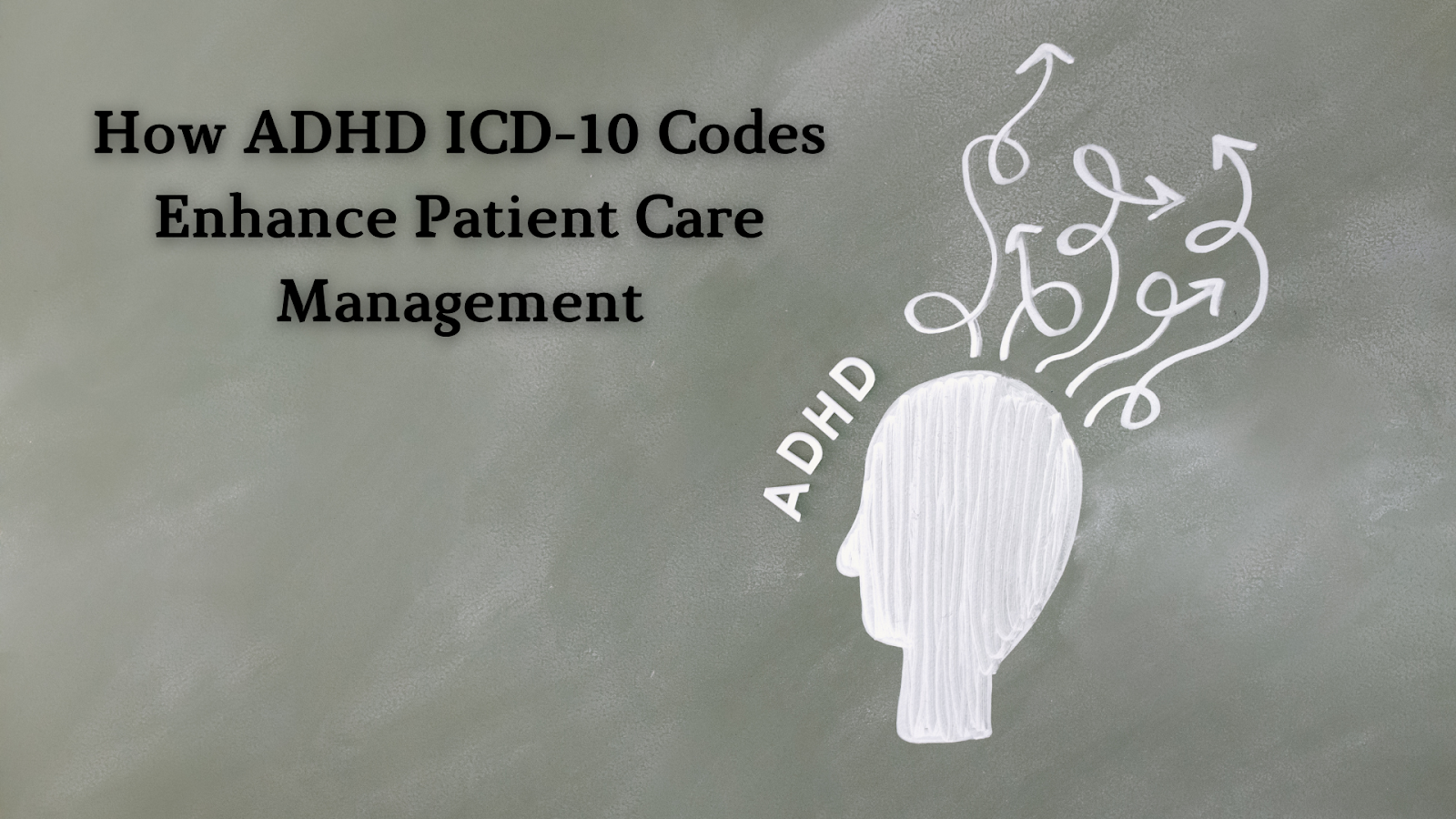Accuracy in diagnosing and treating Attention-Deficit/Hyperactivity Disorder (ADHD) is critical. Healthcare providers and patients often face the frustration of misdiagnosis or delayed care due to coding inaccuracies, which can be a major pain point.
By implementing the International Classification of Diseases, 10th Revision (ICD-10) codes, these challenges can be mitigated.
These codes not only streamline administrative processes but significantly enhance patient care by ensuring precise diagnosis and enabling tailored treatment plans, leading to improved health outcomes and increased patient satisfaction.
Understanding ADHD and Its Impact
ADHD is a neurodevelopmental disorder that significantly impacts children and often continues into adulthood, affecting various aspects of daily life. Due to its widespread prevalence, it is crucial to employ effective and efficient diagnostic and management strategies.
These strategies are essential for addressing the multiple challenges and complexities associated with ADHD, ensuring better outcomes for those affected. Such comprehensive approaches are vital to enhance the quality of life and assist individuals in achieving their potential, underscoring the importance of tailored interventions.
The Role of ICD-10 Codes in ADHD Diagnosis
Understanding the correct ADHD ICD-10 codes is crucial for accurate diagnosis and treatment. Here are the specific codes in the F90 category:
ADHD Specific Codes (F90 Category)
- F90.0: For predominantly inattentive symptoms.
- F90.1: For predominantly hyperactive-impulsive symptoms.
- F90.2: For symptoms that are both inattentive and hyperactive-impulsive.
- F90.8: For other specified types of ADHD, which do not conform exactly to the above types.
- F90.9: For unspecified ADHD, where the type isn’t clearly defined.
Purpose and Impact: Each code not only specifies the subtype of ADHD but also guides targeted treatment plans and facilitates efficient care management, ensuring that each patient’s unique needs are addressed accurately.
Why Accurate Coding Matters
Precise coding transcends bureaucratic necessity; it’s fundamental to effective ADHD management. Here’s how it makes a difference: Tailored treatment plans are crucial, as different ADHD subtypes may respond uniquely to specific interventions. Accurate coding ensures that treatments are correctly aligned with each patient’s individual needs.
Furthermore, proper coding is critical for securing insurance coverage, helping to prevent the denial of treatment funds. In research and epidemiology, precise codes yield more reliable data, advancing our understanding of ADHD.
Also, when patients transition between healthcare providers, accurate coding plays a pivotal role in ensuring continuity of care by clearly communicating the specific ADHD subtype and history to the new team, promoting seamless patient management.
Addressing Comorbid Conditions
ADHD rarely exists in isolation, often presenting alongside other conditions such as anxiety, depression, or learning disabilities. This complexity not only complicates the clinical picture but also poses unique challenges and opportunities for healthcare management. Recognizing the importance of comprehensive coding is crucial in such cases.
Accurately documenting multiple conditions like ADHD and generalized anxiety disorder provides a complete overview of a patient’s health, ensuring that treatment plans are well-rounded and resources are allocated appropriately. This holistic approach to coding ensures that each patient receives tailored care that addresses all facets of their health, enhancing overall treatment efficacy.
Comparison: ADHD Management With and Without Precise ICD-10 Coding
To illustrate the impact of accurate coding on patient care, let’s compare two scenarios:
| Aspect | Without Precise Coding | With Precise Coding |
| Diagnosis Clarity | Vague or incomplete understanding of ADHD subtype | Clear identification of specific ADHD presentation |
| Treatment Efficacy | Generic approach, potentially less effective | Tailored interventions based on exact subtype |
| Insurance Coverage | Higher risk of claim denials (up to 30%) | Improved likelihood of coverage approval |
| Care Coordination | Limited information shared between providers | Comprehensive health picture available to all care team members |
| Research Contribution | Less reliable data for ADHD studies | More accurate representation in research and epidemiology |
| Patient Outcomes | Potentially suboptimal due to the generalized approach | Optimized care leads to better symptom management |
This comparison underscores how precise ICD-10 coding can significantly enhance various aspects of ADHD patient care, from initial diagnosis to long-term management and research contributions.
Future Trends in ADHD Coding and Management
- Refinement of ICD Codes: Future revisions may introduce more nuanced codes to better capture the spectrum of ADHD presentations.
- Integration with Digital Health Tools: Expect integration of ICD codes with digital platforms for real-time symptom tracking and updates.
- AI-Assisted Coding: Machine learning algorithms could aid clinicians in selecting the most appropriate codes based on detailed patient data and symptoms.
- Personalized Medicine: As we gain a deeper understanding of the genetic factors in ADHD, coding might evolve to include genetic markers, enabling more personalized treatment approaches.
Enhancing Patient Care Through Accurate Coding
- Accurate ICD-10 Coding for ADHD: More than just an administrative task, it’s essential for patient care.
- Facilitates Clear Communication: Standardized codes help ensure that healthcare providers are on the same page about a patient’s condition.
- Enables Targeted Treatment: Detailed descriptions from these codes allow for more effective and specific treatment strategies.
- Supports Insurance Coverage: Accurate coding is crucial for securing fair and appropriate insurance reimbursements.
- Contributes to ADHD Research: These codes help gather data that advances our understanding of ADHD.
Role of Healthcare Providers
- Stay Informed: Keeping up-to-date with the latest coding guidelines is crucial.
- Thorough Documentation: Accurately documenting symptoms ensures patients receive the most effective care.
Conclusion
The implementation of ICD-10 coding would considerably improve the management and treatment of this highly prevalent neurodevelopmental disorder. Classification in ICD-10 enables a much deeper and more detailed approach, thus contributing to the proper treatment plans from healthcare providers to their patients as well as simplifying the process with insurance.
With specific coding for various ADHD subtypes, the system can ensure that treatments are targeted and appropriately applied according to the needs of each patient. In addition, ICD-10 provides a basis for a holistic system in the domain of health care, as one that fosters better results with ADHD patients. This makes it a critical part of medical practice today.
FAQs
How does ICD-10 improve patient care?
ICD-10 encourages patient care by providing highly specific diagnostic codes, thereby improving treatment and health follow-up.
What is the ICD-10 for ADHD management?
The ICD-10 codes for ADHD management fall under the category F90, with specific codes like F90.0, F90.1, and F90.2 identifying different ADHD subtypes.
What is the clinical management of Attention-deficit hyperactivity disorder?
The clinical treatment of ADHD will be a combination of medications, behavioral therapies, and educational interventions adapted to the individual type of specific symptomatology and needs.
What is the correct coding assignment for ADHD?
The appropriate ICD-10 coding for ADHD depends on the type. F90.0 should be used for predominantly inattentive types. For the predominantly hyperactive-impulsive type, the ICD-10 coding is F90.1. In the case of a combined type, use F90.2.





